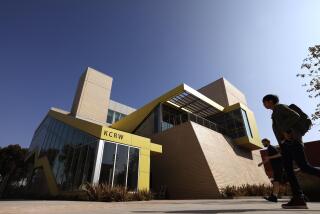KCET-TV downplays downbeat funding report
The people who run KCET-TV see a solid future ahead. But the station’s accountants aren’t so sure.
KCETLink, the nonprofit organization that runs the independent public TV outlet based in Burbank, “has suffered recurring losses that raise substantial doubt about its ability” to stay in business, according to recently released financial documents.
The organization lost $12.5 million for the fiscal year that ended June 30, on top of $7.4 million in red ink the previous year, according to a recent audit by accounting and business consulting firm SingerLewak. The main source of income — corporate grants and contributions from individual donors — amounted to roughly $22 million last year.
BEST TV OF 2013 Lloyd | McNamara
To pay for basic expenses, the company was forced to borrow nearly $3 million from restricted funds earmarked for specific purposes, although it has since paid back that money.
Officials at KCET — which left PBS amid acrimony in late 2010 and is the home of such fare as the newsmagazine “SoCal Connected” — says the Dec. 6 accountants’ report makes the situation sound more dire than it is and that the company’s finances have improved since then.
The report, which the station made public earlier this month, “represents a snapshot of past performance and does not reflect our current financial health,” Ariel Carpenter, a KCETLink spokeswoman, wrote in an email when asked for comment.
PHOTOS: Faces to watch 2014 | TV
The company has balanced its budget since then by trimming more than one-third of its monthly expenses, partly through layoffs, she added. The Ahmanson Foundation recently ponied up $1 million to help fund the sixth season of “SoCal Connected.” The station could also raise some much-needed cash by selling off about half of its broadcast spectrum in an auction that will be run by the Federal Communications Commission in 2015.
Al Jerome, chief executive of KCETLink, was not available for comment, Carpenter said.
Many of KCET’s current woes can be traced to its departure from PBS, which came after Jerome and the board battled PBS for months over what the station deemed excessive dues and other issues. In a surprise move, KCET decided to forge its own path as an independent station starting in 2011, just as changes in the TV industry were making it hard for local outlets to survive without a large corporate backer.
WINTER TV PREVIEW: Full coverage of the season’s shows
KCET was forced to forgo PBS’ popular programming, including “Downton Abbey,” “Sesame Street” and “Charlie Rose.” Fundraising appeals at PBS stations often trade heavily on viewers’ attachment to such series.
In lieu of PBS shows, KCET has relied on a mix of locally produced series (including “Artbound,” about Southern California artists), how-to programs on such topics as dog training and cooking, and “BBC World News.” In January, the station’s most-watched program was the British comedy “Doc Martin,” which averaged 66,000 total viewers.
Station officials have admitted in the past that fundraising took a hit without the PBS brand to attract support from viewers.
CRITICS’ PICKS: What to watch, where to go, what to eat
While other PBS stations across the nation have battled with the network over similar issues, KCET was by far the largest station to leave and led to KOCE-TV (now PBS SoCal) becoming the area’s dominant public TV outlet.
“KCET is in very uncharted waters, so it’s not surprising to me to see that they’re experiencing some struggles,” said Alan Stavitsky, dean of the Reynolds School of Journalism at the University of Nevada, Reno, who has written extensively about public television.
The station has undertaken a series of steps to improve its position. In 2011 it sold its 4.5-acre landmark studio in Silver Lake to the Church of Scientology. KCET later moved its operations to a high-rise in Burbank.
PHOTOS: Celebrities by The Times
In 2012, KCET merged with Link Media, a San Francisco-based nonprofit that operates a satellite network and online news portal. The companies laid off 21 employees when the merger went through and KCETLink cut an additional 36 workers last April.
There have been some missteps along the way.
In August 2011, KCET announced an “innovative partnership” with Dominique Bigle, the French-born chief executive of Los Angeles-based production company Eyetronics Media and Studios. That ambitious deal, set to run for five years, would offer an investment of “up to $50 million” to acquire and produce new programming for KCET that could then be distributed around the world.
But the partnership yielded just one title, an inexpensively produced clip show called “Classic Cool Theater.” KCET quietly abandoned the partnership in August 2012 after a Times story reported that Bigle’s company was behind on the rent for its office space.
“KCET never received that investment,” Carpenter said. “Much to our disappointment, no new productions resulted from that partnership.”
More to Read
The complete guide to home viewing
Get Screen Gab for everything about the TV shows and streaming movies everyone’s talking about.
You may occasionally receive promotional content from the Los Angeles Times.














































